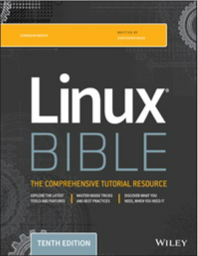Linux Bible, 10th Edition
Linux Bible, 10th Edition is the ultimate hands-on Linux user guide, whether you're a true beginner or a more advanced user navigating recent changes.
This updated tenth edition covers the latest versions of Red Hat Enterprise Linux (RHEL 8), Fedora 30, and Ubuntu 18.04 LTS. It includes information on cloud computing, with new guidance on containerization, Ansible automation, and Kubernetes and OpenShift. With a focus on RHEL 8, this new edition teaches techniques for managing storage, users, and security, while emphasizing simplified administrative procedures with Cockpit. Written by a Red Hat expert, this book provides detailed explanations and step-by-step instructions that demystify Linux and bring the new features seamlessly into your workflow.
This useful guide assumes a base of little or no Linux knowledge and takes you step by step through what you need to know to get the job done.
Linux Bible, 10th Edition is the one resource you need and provides the hands-on training that gets you on track in a flash.
Read More
By submitting this form you agree to IT Corporate contacting you with marketing-related emails or by telephone. You may unsubscribe at any time. IT Corporate web sites and communications are subject to their Privacy Notice.
By requesting this resource you agree to our terms of use. All data is protected by our Privacy Notice. If you have any further questions please email dataprotection@techpublishhub.com
Related Categories: Linux


More resources from IT Corporate

Serious Python: Black-Belt Advice on Deployme...
An indispensable collection of practical tips and real-world advice for tackling common Python problems and taking your code to the next level. Fea...

Cloud Computing for Dummies
Cloud computing is a topic that technology pros need to know to stay ahead of the computing game. Cloud Computing For Dummies comes to the rescue o...

2019 IT Skills and Salary Report
The 2019 IT Skills and Salary Report provides the most informative and revealing insights into the inner workings of worldwide IT departments. This...